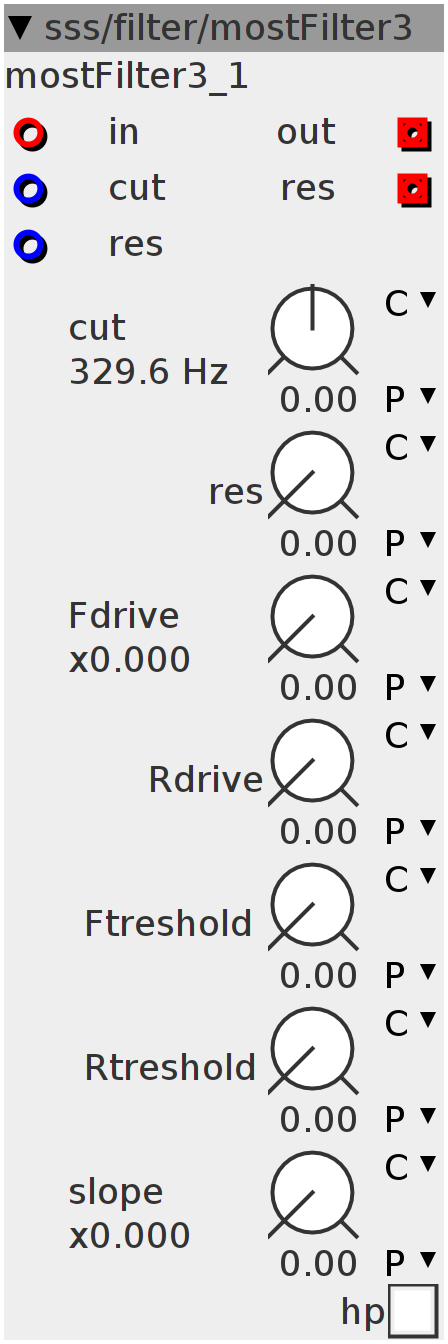mostFilter3
My own filter, with a filtering based on the workings of "gravity". This version has limiters/distortions added in both the normal filter path as well as the "resonance" path (the rate at which the filter can respond) and also just before the filter to prevent errors caused by "too hot levels". -first stage: soft-clipping (native soft-distortion algorithm) -second stage: adding an extra 6dB LP-filter. Note though, that this has another effect when in HP-mode, actually adding back bass to the HP-filter because of phase-differences caused by the 2-sample delay. -third stage: calculating the rate-in/decrease based on input and current filter position -fourth stage: limiting the rate -fifth stage: applying rate to filter -sixth stage: limiting the filter -seventh stage: optionally adding inversed input signal to filter to get HP-mode. The "treshold" limiter is a hard-clipper. The "drive" subtracts a 3rd degree power from the signal to limit it's range. Because of the curve, it has a bit softer distortion then the hard limiter.
Inlets
frac32buffer in
frac32 cut
frac32 res
Outlets
frac32buffer out
frac32buffer res
Parameters
frac32.u.map res
frac32.u.map Rdrive
frac32.u.map Ftreshold
frac32.u.map Rtreshold
frac32.u.map.gain Fdrive
frac32.u.map.gain slope
bool32.tgl hp
frac32.s.map.pitch cut
int32_t pos;
int32_t spd;
int32_t v27 = 1 << 27;
int32_t prv;
int32_t th;
int32_t lp;int32_t frq;
MTOF(param_cut + inlet_cut, frq)
frq = frq >> 1;
int32_t damp = (int32_t)((v27 - __USAT(param_res + inlet_res, 27) * 0.99)) << 3;
int32_t Damp = (int32_t)(v27 - ((v27 - __USAT(param_Rdrive, 27) * 0.99))) << 3;
int32_t Rtreshold = param_Rtreshold;
Rtreshold = ___SMMUL(Rtreshold << 3, Rtreshold << 2);
int32_t Ftreshold = param_Ftreshold << 1;int32_t in;
int32_t ts = __SSAT(inlet_in, 28);
int32_t tsq31 = ts << 3;
int32_t tsq31p3 = ___SMMUL(tsq31, ___SMMUL(tsq31, tsq31));
in = ts + (ts >> 1) - (tsq31p3);
lp += ___SMMUL((in - lp) << 1, frq << 1) << 1;
int32_t Tmp;
if (param_hp == 0) {
Tmp = lp - in;
} else if (param_hp == 1) {
Tmp = -lp;
}
int32_t LP = in + (___SMMUL(Tmp, param_slope));
spd += ___SMMUL((LP - pos), frq) << 3;
int32_t tmp = ___SMMUL(spd, __USAT(Damp, 30)) << 1;
spd -= ___SMMUL(tmp, ___SMMUL(tmp, tmp) << 5) << 7;
th = spd;
th = th > 0 ? th : -th;
th = th > Rtreshold ? __USAT(th - Rtreshold, 26) << 4 : 0;
spd -= ___SMMUL(spd, __USAT(th, 30));
pos += spd;
th = pos;
th = th > 0 ? th : -th;
th = th > Ftreshold ? __USAT(th - Ftreshold, 26) << 4 : 0;
pos -= ___SMMUL(pos, __USAT(th, 30));
int32_t dp = LP - pos;
dp = dp > 0 ? dp : -dp;
dp = ___SMMUL(dp, param_Fdrive) << 1;
dp = ___SMMUL(dp, ___SMMUL(dp, dp) << 5) << 5;
pos -= ___SMMUL(pos, __USAT(dp, 26)) << 5;
pos -= ___SMMUL(pos, __USAT(damp, 30));
outlet_out = pos - (param_hp > 0 ? in : 0);
outlet_res = -(spd - prv) << 1;
prv = spd;